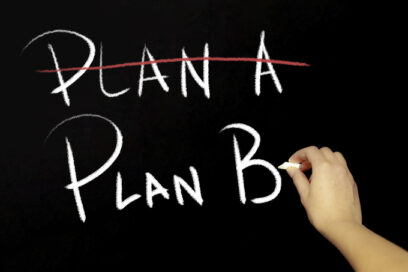Lately, I’ve been finding my monthly blog posts on leadership to either be connected to incredibly mundane parts of life or significant events. I recognize that the terms “mundane” and “significant” will mean different things for different people, so I want to represent the fact that I am only speaking from my own experiences. With that said, it has been fascinating to me that the last few months have led me to reflect on my growth as a leader from what has felt like polar extremes.
The month of February was no different, as during a family vacation with friends, my wife fell down an escalator at a theme park, forcing a visit to a local hospital and a massive shift in what we had planned for our time away. Before diving into some learned leadership lessons, it is important to share that, while the recovery process was long, my wife is doing well. Of course, that is the most important thing. With all of that in mind, here are four important considerations for when disaster strikes.
Go with the flow
When my wife fell, it was clear that she wasn’t going to spring back into her normal way of living right away. She never wants any type of help, and the fact that she wanted to go to the hospital told me all I needed to know. The second the first-aid team and EMTs arrived, I knew that I was going to need to forgo my instinct to have a plan and control for a given situation and just go with the flow.
I have written quite a bit about the importance of flexibility in leadership in the past, and this was a great example of a real-life case for maximum awareness of the need to follow directions, ask questions and stay out of the way. This allowed me to focus more on monitoring her care and staying connected to the decisions that were being made around her wellness without having to worry about all the ancillary logistics elements that come from “being in control.” I would like to think that this allowed me to be a better support for her needs throughout.

Always have a Plan B (and C)
Clearly, our vacation plans had to shift with my wife’s injury. We were unable to do what we had hoped to do, and the trip became more about rest and relaxation than anything else (at least for my wife and for me). We were fortunate that we had traveled with friends and therefore were able to provide our kids with activities during the trip. Of course, this put an extra burden on what our friends were able to do for themselves.
The benefit, of course, was that by being flexible and having options in place, we could make the most of the situation for everyone involved. Our ability to have a Plan B was influenced by our friends traveling with us; our response would have been very different were we traveling alone. That said, this was a great reminder of the need to always have pathways in place, regardless of the situation or scenario. With options present, we can make better decisions and provide opportunities that would not be accessible if there were only one way to move forward.
It’s not about you (until it is)
My wife’s injury required me to set aside my own needs for hers. That is to be expected. It also reminded me that this idea of putting the needs of others before ourselves doesn’t invalidate our needs in totality. In other words, the needs of different people do not have to be mutually exclusive.
Here’s how this played out in our vacation situation:
My wife’s needs when we arrived back home required me to take on a number of additional tasks that I wouldn’t have otherwise. This, in turn, meant that some of our work as a family could not adequately be done until my wife was back in good health. As I still needed to be present at work, and as my kids still needed to go to school, some sports practices and other events could not be done. There simply was no way to make them happen.
While it never feels good to miss out on any opportunity, sometimes it is necessary if the needs of multiple people are going to be met together.
Reprioritize
Events like this that often come suddenly and that shift the way our normal lives work, can force us to rethink priorities. This doesn’t necessarily mean our lives are changed for a long period of time, but it does mean that we have to go about business as usual in a non-usual way. While my wife was in her most injured state, we simply shifted back to truly focusing on everyone’s health and basic needs (food, sleep, school, work). It was a simple way of thinking about things, and sometimes we need to get back to basics. With so many complications taking up our days and nights, a more simple process can help us reset.
Of course, I would not suggest we should reprioritize through a disaster of some kind; instead, I think it is just important to note that giving ourselves the time to consider what is most important allows us to separate the “important now” from everything else.
I would never want to see anyone learning through injury. I know the trip would have been much more enjoyable for everyone (especially my wife) had she not fallen. That said, if we are willing to look at every experience through the lens of what we can reflect upon, then we are more likely to see life’s experiences as valuable for our continued growth and our continued ability to change.
Opinions expressed by SmartBrief contributors are their own.
_________________________
Subscribe to SmartBrief’s FREE email ASCD newsletter to see the latest hot topics in education. It’s among SmartBrief’s more than 250 industry-focused newsletters.
